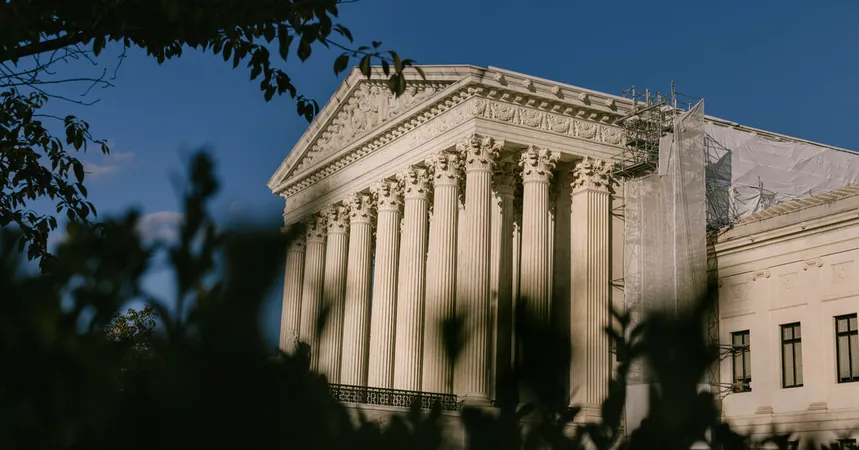
Supreme Court Poised to Greenlight Securities Fraud Case Against Nvidia: What You Need to Know!
2024-11-13
Author: Ken Lee
Introduction
In a significant move that could have serious implications for securities fraud cases, the Supreme Court seems ready to allow a lawsuit against Nvidia, the renowned semiconductor manufacturer, over claims of misleading investors regarding its dependence on the cryptocurrency mining sector during 2017 and 2018.
Background of the Case
This marks the second major argument presented this month regarding securities fraud suits against high-profile tech companies. Just last week, the justices debated whether investors should be permitted to bring a case against Facebook for alleged failures to disclose a data breach adequately. While different in their legal aspects, both cases highlight a common concern: judges are wrestling with the potential flood of securities fraud lawsuits, which may compel companies to settle even when they believe they are innocent.
Judicial Concerns
Justice Brett M. Kavanaugh articulated a pressing concern during the discussion surrounding the Facebook case, stating, “Getting past the motion to dismiss is kind of — it’s the game, right?” This insightful comment underscores the precarious position companies find themselves in and the impact it could have on the broader economy if such lawsuits proliferate.
Legislative Background
In response to these concerns, Congress enacted the Private Securities Litigation Reform Act in 1995, establishing stricter guidelines for investors to substantiate claims at the outset of litigation. The act aimed to deter frivolous lawsuits while ensuring that legitimate claims could still be pursued. Justice Ruth Bader Ginsburg famously noted in 2007 that the law was designed to balance these two critical objectives.
Arguments Presented
During Wednesday’s arguments, Nvidia's lawyer, Neal K. Katyal, contended that the plaintiffs—a pension fund and an investment firm—failed to meet the law's criteria, which mandates investors provide specific details outlining which company statements were false. Katyal asserted that the suit relied too heavily on an external expert report instead of internal documents that could lend credibility to their claims. He emphasized, 'A series of maybes is not enough.'
However, Justice Ketanji Brown Jackson raised an important counterpoint, suggesting that such stringent requirements might place an undue burden on plaintiffs who would need access to detailed documents that could only become available if legal proceedings advanced.
Plaintiffs' Position
The plaintiffs' attorney, Deepak Gupta, argued that his clients had presented substantial information gathered from former Nvidia employees, suggesting that their claims were well-founded. Justice Kavanaugh reiterated his assertion that an unchecked wave of securities fraud suits could jeopardize the American economy if businesses faced lawsuits every time their stock price dropped.
Economic Implications
Moreover, in a fascinating twist, Justice Elena Kagan noted the irony that Nvidia's stock price deterioration in 2018 could have been obscured by its current dominance in the artificial intelligence chip market—a fact that illustrates how rapidly the tech landscape changes and the need for adaptive legal standards.
Court's Decision and Future Implications
The case, Nvidia v. E. Ohman J:or Fonder AB, No. 23-970, has left several justices uneasy, with some questioning why the court agreed to hear such a complicated issue in the first place. Justice Samuel A. Alito Jr. pointed out the technicality involved, expressing doubt about the court's ability to make informed decisions at a preliminary stage.
As the nation watches, the Supreme Court’s forthcoming ruling could set a crucial precedent that determines the future of securities fraud litigation and the extent to which corporations can be held accountable for their disclosures. With Nvidia at the forefront of the AI revolution and the potential for massive financial ramifications, this case is not just about one company—it's about the integrity of the entire tech industry. Will the Supreme Court uphold investor protection, or will they impose new barriers that could shield corporations from accountability? Only time will tell!

 Brasil (PT)
Brasil (PT)
 Canada (EN)
Canada (EN)
 Chile (ES)
Chile (ES)
 España (ES)
España (ES)
 France (FR)
France (FR)
 Hong Kong (EN)
Hong Kong (EN)
 Italia (IT)
Italia (IT)
 日本 (JA)
日本 (JA)
 Magyarország (HU)
Magyarország (HU)
 Norge (NO)
Norge (NO)
 Polska (PL)
Polska (PL)
 Schweiz (DE)
Schweiz (DE)
 Singapore (EN)
Singapore (EN)
 Sverige (SV)
Sverige (SV)
 Suomi (FI)
Suomi (FI)
 Türkiye (TR)
Türkiye (TR)